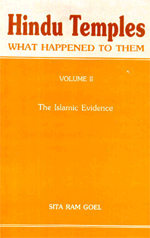|
 Page 1
Page 1
I
In the present study we have used the expression “Hindu temples” to cover Brahmanical as well as Buddhist Jain, and Sikh temples. This sounds contrary to current usage in the world of scholarship as well as politics. But the history of the word “Hindu” supports our case. It was only in the nineteenth century that Western Indologists and Christian missionaries separated the Buddhists, the Jains, and the Sikhs from the Hindus who, in their turn, were defined as only those subscribing to Brahmanical sects. The missionaries invented another category, the Animists, which they employed in order to separate the tribals from the Hindus of their definition. It will, therefore, be worthwhile to survey the history of the word “Hindu”, and see what it has meant, at what stage, and to whom.
A close study of literary and epigraphic sources shows that the word “Hindu” has appeared in our indigenous languages and popular parlance in a comparatively recent period, keeping in view the long span of our history. We do not find this word in any indigenous language prior to the establishment of Islamic rule in the thirteenth century. Even after that, the word was used rather sparsely in the local literature. Monier-Williams who compiled his famous dictionary from a large range of Sanskrit literature, could not find any indigenous root for this word. He says explicitly that the word is derived “from the Persian Hindû”. Dictionaries of all indigenous languages say the same. So also the dictionaries of European languages.
The word Hinduism” has been added to our vocabulary at a still more recent stage. It has been contributed by the discipline of Indology in die modern West. And the word gained wide currency in this country simply because the leaders of our national reawakening in the second half of the nineteenth century, espoused it as expressive of our national identity as well as our spiritual and cultural greatness. These leaders, down to Mahatma Gandhi, were not prepared to concede that Hinduism did not include Buddhism, or Jainism, or, for that matter, Sikhism.
Of course, some scholars of Hindutva have tried to trace the word “Hindu” to Saptasindhu which is mentioned in the Rigveda on several occasions. They want this word to have an indigenous as well as an ancient ring. The intention is understandable. But the excercise has remained forced, if nor far-fetched. Firstly, it does not notice that the expression used in the Rigveda is not Saptasindhu but Saptasaindhvah. Secondly, it ignores the fact that the Rigveda is not quite clear whether the expression stands for a country, or for a people, or simply for seven rivers in the Punjab. The expression seems to mean different things in different contexts. Thirdly, it does not explain why the change from “Sindhu” to “Hindu” took such a long time to surface in our indigenous languages. Lastly, and more significantly, it has not taken into account the fact that our countrymen were never known as Hindus in Southeast Asia in the pre-Islamic period, although they had a large presence there since centuries before the birth of Christ.
About Author : Shri Sita Ram Goel
|